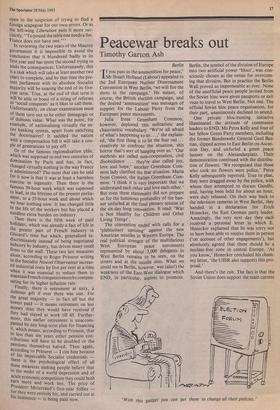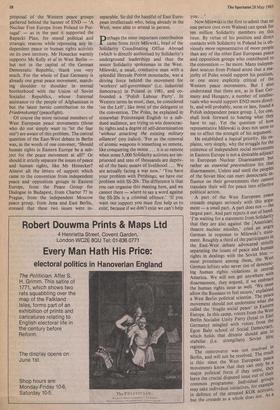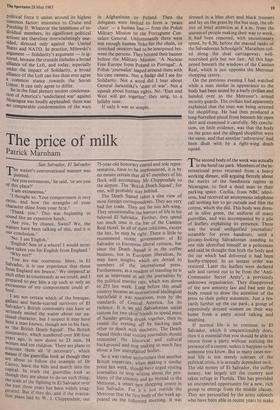Peacewar breaks out
Timothy Garton Ash
Berlin f you pass us the ammunition for peace,'
Mr Stuart Holland (Labour) appealed to the 2nd European Nuclear Disarmament Convention in West Berlin, 'we will fire the shots in the campaign.' He meant, of course, the British election campaign, and the desired 'ammunition' was messages of support for the Labour Party from the European peace movements.
Julia from Greenham Common, however, deplored this militaristic and chauvinistic vocabulary. 'We're all afraid of what's happening to us...,' she explain- ed, 'the first thing is to let the fear out ... creatively to confront the situation, this horror that's sort of hanging over us.' Our methods are called non-cooperation, civil disobedience ... they're also called joy, love and hope,' another Greenham Com- mon lady clarified the fear situation. Maria from Comiso, the Italian Greenham Com- mon: 'I think it is very important that we understand each other and love each other.' But even these statements did not prepare us for the luminous profundity of the ban- ner unfurled at the final plenary session of the six-day long convention. It read: 'War is Not Healthy for Children and Other Living Things'.
The convention ended with calls for a `plebiscitary uprising' against the new American missiles in Western Europe. The real political strength of the multifarious West European peace movements represented by about 3,000 delegates in West Berlin remains to be seen, on the streets and at the missile sites. What we could see in Berlin, however, was (alas!) the weakness of the East-West dialogue which END, in particular, aspires to promote.
Berlin, the symbol of the division of Europe into two artificial power 'blocs', was con- sciously chosen as the venue for overcom- ing that division. But in practice the Berlin Wall proved as impermeable as ever. None of the unofficial peace people invited from the Soviet bloc were given passports or exit visas to travel to West Berlin. Not one. The official Soviet bloc peace organisation, for their part, unanimously declined to attend.
One private bloc-busting initiative illuminated the attitude of communist leaders to END. Ms Petra Kelly and four of her fellow Green Party members, including the former Bundeswehr General Gerd Bas- tian, slipped across to East Berlin on Ascen- sion Day, and unfurled a green peace banner on the Alexanderplatz. Their demonstration continued with the distribu- tion of flowers. 'We recognised that those who took no flowers were police,' Petra Kelly subsequently reported. True to plan, they were dragged away by the police, with whom they attempted to discuss Gandhi, and, having been held for about an hour, were duly released. On their way back to the television cameras in West Berlin, they handed in a declaration for Erich Honecker, the East German party leader. Amazingly, the very next day they each received a personal letter in which E. Honecker explained that he was sorry not to have been able to receive them in person Con account of other engagements'), but absolutely agreed that there should be a nuclear-free zone in central Europe. 'As you know,' Honecker concluded his chum- my letter, 'the USSR also supports this pro- posal.'
And there's the rub. The fact is that the Soviet Union does support the main current With this gadget you can get them to change all their policies.' proposal of the Western peace groups gathered behind the banner of END — 'A Nuclear Free Europe from Poland to Por- tugal' — as in the past it supported the Rapacki Plan, for sound political and strategic reasons while repressing any in- dependent peace or human rights activists on its own territory. Mr Honecker warmly
supports Ms Kelly et al in West Berlin but not in the capital of the German Democratic Republic, thank you very much. For the whole of East Germany is already one great peace movement, march- ing shoulder to shoulder in eternal brotherhood with the Union of Soviet Socialist Republics, whose fraternal assistance to the people of Afghanistan is but the latest heroic contribution to the Friedenskampf (peacefight).
Of course the more rational members of West European peace movements (those who do not simply want to 'let the fear out') are aware of this problem. The central question of the East-West debate in Berlin was, in the words of one convener, 'Should human rights in Eastern Europe be a sub- ject for the peace movement at all?' Or should it strictly separate the issues of peace and human rights, like Mr Honecker? Almost all the letters of support which came to the convention from independent peace and opposition groups in Eastern Europe, from the Peace Group for Dialogue in Budapest, from Charter 77 in Prague, from the independent Moscow peace group, from Jena and East Berlin, stressed that these two issues were in-
separable. So did the handful of East Euro- pean intellectuals who, being already in the West, were able to attend in person.
Perhaps the most important contribution came from Jerzy Milewski, head of the Solidarity Coordinating Office Abroad (which is directly authorised by Solidarity's underground leadership) and thus the senior Solidarity spokesman in the West. Milewski, a small, combative man with a splendid Hercule Poirot moustache, was a driving force behind the movement for `workers' self-government' (i.e. industrial democracy) in Poland in 1981, and co- founded a 'Polish Labour Party'. In Western terms he must, then, be considered 'on the Left', like most of the delegates to the convention. The Poles, he explained in somewhat Poirotesque English to a sub- dued audience, are trying to win democrac- tic rights and a degree of self-determination `without attacking the existing military alliances' (my italics). 'For us the removal of atomic weapons is something so remote, like conquering the moon . • . it is so remote when some 5,000 Solidarity activists are im- prisoned and tens of thousands are depriv- ed of the basic means of livelihood ... We are actually facing a war now.' You have your problem with Pershings; we have our problem with SS-20s. The difference is that you can organise this meeting here, and we cannot there — where to say a word against the SS-20s is a criminal offence.' If you want our support you must first help us to exist, because if we don't exist we can't help
you...'
Now Milewski is the first to admit that no one person (not even Walesa) can speak for ten million Solidarity members on this issue. By virtue of his position and direct contacts with Solidarity in Poland he is ob- viously more representative of more people than any of the other East European peace and opposition groups who contributed to the convention — far more. Many indepen- dent sources from Poland attest that a ma- jority of Poles would support his position, or one more explicitly critical of the Western peace movements. But I also understand that there are, as in East Ger- many and Hungary, a number of intellec- tuals who would support END more direct- ly, and will probably, soon or late, found a Polish independent peace group. I, for one, shall look forward to hearing what they have to say. Yet the question of how representative Milewski is does not seem to me to affect the strength of his argument.
He established a logical priority. He ex- plains, very simply, why the struggle for the existence of independent social movements in Eastern Europe is not a desirable adjunct to European Nuclear Disarmament but rather an essential precondition for that disarmament. Unless and until the peoples of the Soviet bloc can exert democratic in- fluence on their governments they cannot
political io
translate atchteirnwill for peace into effective A part of the West European peace crusade engages seriously with this argu- ment — a small part. A part does not — the largest part. And part rejects it out of hand. 'I'm waiting for a statement from Solidarity that they are also against the [American] theatre nuclear missiles,' cried an arl8rY German in response to Milewski's state- ment. Roughly a third of the participants in the East-West debate advocated strictly separating the issues of peace and human rights in dealings with the Soviet bloc — most prominent among them, the West German leftists who never tire of denounc- ing human rights violations in central America. We will not get anywhere with disarmament, they argued, if we embrace the human rights issue as well. 'We must allow the Russians to feel secure,' explained a West Berlin political scientist. The peace movement should not undermine what she called the 'fragile social peace' in Eastern Europe. In this camp, voices from the West Berlin Socialist Unity Party (loyal to East Germany) mingled with voices from the Egon Bahr school of Social Democracy, which holds that detente should aimbiotoe sretagbimilisees. (i.e. strengthen) Soviet The controversy was not resolvecIirt Berlin, and will not be resolved. The re su
ace
is this: since the West European pe movements know that they can only be a major political force if they unite, theyr leave the crucial disputed issue out of theis
p common programme. Individual groue may take individual initiatives, for example in defence of the arrested KOR activists, but the crusade as a whole does not. As a political force it unites around its highest common factor: resistance to Cruise and Pershing H. Whatever the intentions of in- dividual members, its significant political actions are therefore overwhelmingly one- sided, directed only against the United States and NATO. In practice, Milewski's argument — Solidarity's argument — is ig- nored, because the crusade includes a broad alliance of the Left, and today, especially under the impact of Solidarity, a broad alliance of the Left can less than ever agree a common stance towards the Soviet Union. It can only agree to differ. So in the final plenary session condemna- tion of America's 'undeclared war' against Nicaragua was loudly applauded: there was no comparable condemnation of the wars in Afghanistan or Poland. Then the delegates were invited to form a 'peace chain' — a human line — from the Polish Military Mission to the Portuguese Con- sulate General. Unfortunately there were not enough human links for the chain, so stretched sweaters had to be interposed bet- ween the persons. They hoisted their banner before the Military Mission: 'A Nuclear Free Europe from Poland to Portugal'. A Polish 'journalist' leaped around them with his tine camera. Not a badge did I see for Solidarity. Not a word did I hear about General Jaruzelski's 'state of war'. Not a squeak about human rights. No. 'East and West will get together' they sang, to a lullaby tune.
If only it was so simple.
















































 Previous page
Previous page